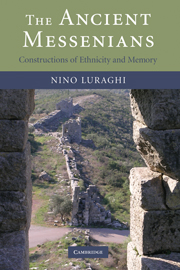Book contents
- Frontmatter
- Contents
- Acknowledgments
- List of abbreviations
- List of illustrations
- Chapter 1 Introduction
- Chapter 2 Delimiting the Messenians
- Chapter 3 The return of the Heraclids and the mythical birth of Messenia
- Chapter 4 The conquest of Messenia through the ages
- Chapter 5 Messenia from the Dark Ages to the Peloponnesian War
- Chapter 6 The Western Messenians
- Chapter 7 The earthquake and the revolt: from Ithome to Naupaktos
- Chapter 8 The liberation of Messene
- Chapter 9 Being Messenian from Philip to Augustus
- Chapter 10 Messenians in the Empire
- Chapter 11 Conclusions
- Bibliography
- Index locorum
- Index of inscriptions
- Archaeological sites
- General index
Chapter 3 - The return of the Heraclids and the mythical birth of Messenia
Published online by Cambridge University Press: 22 September 2009
- Frontmatter
- Contents
- Acknowledgments
- List of abbreviations
- List of illustrations
- Chapter 1 Introduction
- Chapter 2 Delimiting the Messenians
- Chapter 3 The return of the Heraclids and the mythical birth of Messenia
- Chapter 4 The conquest of Messenia through the ages
- Chapter 5 Messenia from the Dark Ages to the Peloponnesian War
- Chapter 6 The Western Messenians
- Chapter 7 The earthquake and the revolt: from Ithome to Naupaktos
- Chapter 8 The liberation of Messene
- Chapter 9 Being Messenian from Philip to Augustus
- Chapter 10 Messenians in the Empire
- Chapter 11 Conclusions
- Bibliography
- Index locorum
- Index of inscriptions
- Archaeological sites
- General index
Summary
By the age of Plato at the latest, the Greeks saw the return of the Heraclids to the Peloponnese at the head of a Dorian army as a turning point, not only for the history of that region, but also for Greek history in general. Although the farther mythical past was certainly very important to them, there is no doubt that in the fifth and fourth centuries the Dorian states of the Peloponnese, and especially the Spartans, had a particularly strong feeling of continuity between their present and the Dorian migration. To choose this mythical episode as a starting point for an investigation of the history of the Messenians is therefore peculiarly appropriate. In the pages that follow, the Dorian migration and the return of the Heraclids will not be considered as historical events, but rather as narrative constructs that variously embody different stages of beliefs about the past held by Greeks of the archaic, classical, Hellenistic and early Imperial ages. In other words, ancient narratives of the Dorian migration and the return of the Heraclids will not be considered here as more or less distorted memories of events of the early Iron Age. Their controversial historicity will not be at stake. The focus will be on their function as foundation myths for polities of the Peloponnese and as ethnic charters for their inhabitants, in an attempt at locating their variants in space and time.
- Type
- Chapter
- Information
- The Ancient MesseniansConstructions of Ethnicity and Memory, pp. 46 - 67Publisher: Cambridge University PressPrint publication year: 2008
- 1
- Cited by

